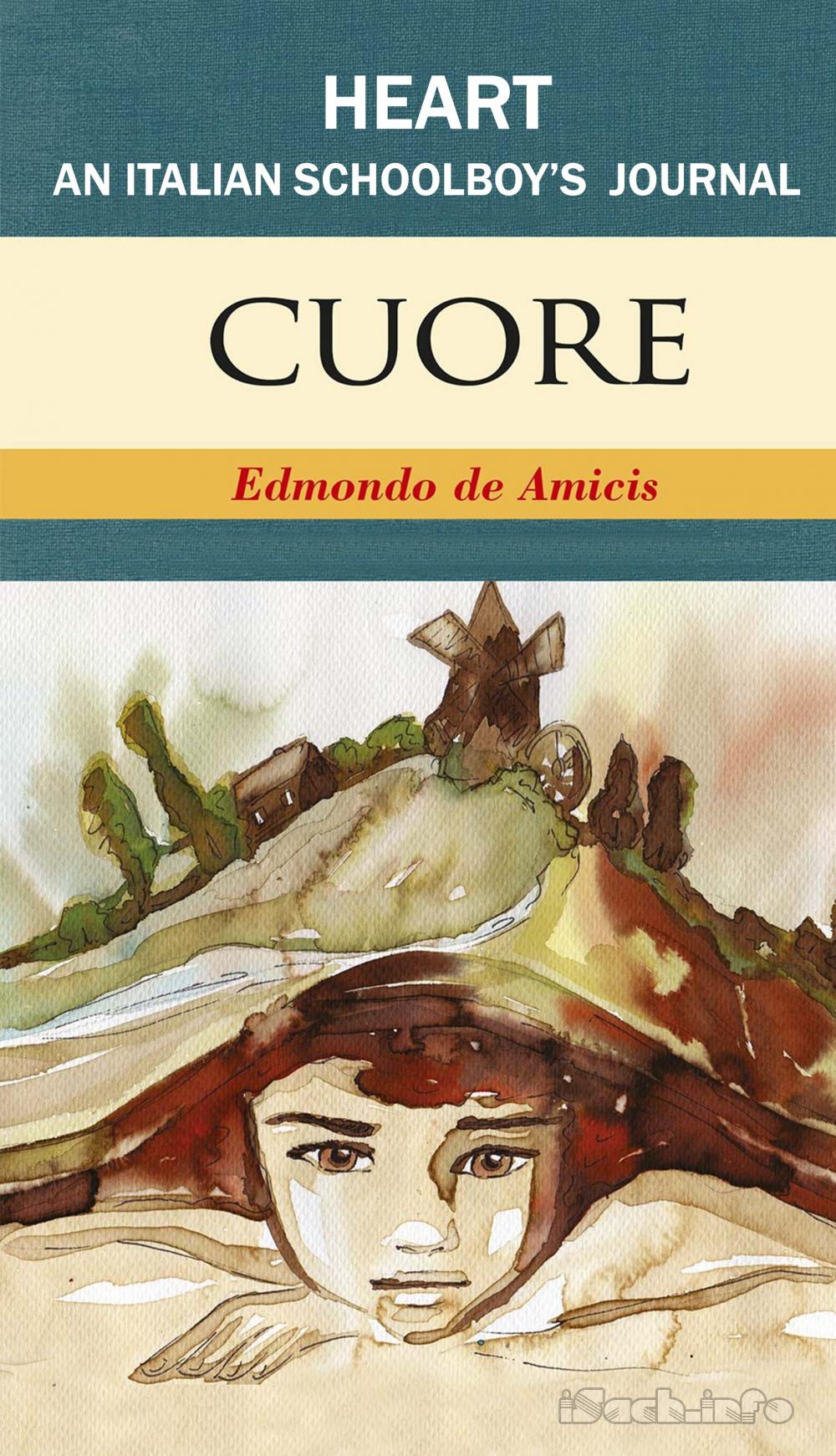Chapter 79: Civic Valor
(Monthly Story.)
At one o’clock we went with our schoolmaster to the front of the town-hall, to see the medal for civic valor bestowed on the lad who saved one of his comrades from the Po.
On the front terrace waved a huge tricolored flag.
We entered the courtyard of the palace.
It was already full of people. At the further end of it there was visible a table with a red cover, and papers on it, and behind it a row of gilded chairs for the mayor and the council; the ushers of the municipality were there, with their under-waistcoats of sky-blue and their white stockings. To the right of the courtyard a detachment of policemen, who had a great many medals, was drawn up in line; and beside them a detachment of custom-house officers; on the other side were the firemen in festive array; and numerous soldiers not in line, who had come to look on,—cavalrymen, sharpshooters, artillery-men. Then all around were gentlemen, country people, and some officers and women and boys who had assembled. We crowded into a corner where many scholars from other buildings were already collected with their teachers; and near us was a group of boys belonging to the common people, between ten and eighteen years of age, who were talking and laughing loudly; and we made out that they were all from Borgo Po, comrades or acquaintances of the boy who was to receive the medal. Above, all the windows were thronged with the employees of the city government; the balcony of the library was also filled with people, who pressed against the balustrade; and in the one on the opposite side, which is over the entrance gate, stood a crowd of girls from the public schools, and many Daughters of military men, with their pretty blue veils. It looked like a theatre. All were talking merrily, glancing every now and then at the red table, to see whether anyone had made his appearance. A band of music was playing softly at the extremity of the portico. The sun beat down on the lofty walls. It was beautiful.
All at once every one began to clap their hands, from the courtyard, from the balconies, from the windows.
I raised myself on tiptoe to look.
The crowd which stood behind the red table had parted, and a man and woman had come forward. The man was leading a boy by the hand.
This was the lad who had saved his comrade.
The man was his father, a mason, dressed in his best. The woman, his mother, small and blond, had on a black gown. The boy, also small and blond, had on a gray jacket.
At the sight of all those people, and at the sound of that thunder of applause, all three stood still, not daring to look nor to move. A municipal usher pushed them along to the side of the table on the right.
All remained quiet for a moment, and then once more the applause broke out on all sides. The boy glanced up at the windows, and then at the balcony with theDaughters of military men; he held his cap in his hand, and did not seem to understand very thoroughly where he was. It struck me that he looked a little like Coretti, in the face; but he was redder. His father and mother kept their eyes fixed on the table.
In the meantime, all the boys from Borgo Po who were near us were making motions to their comrade, to attract his attention, and hailing him in a low tone: Pin! Pin! Pinot! By dint of calling they made themselves heard. The boy glanced at them, and hid his smile behind his cap.
At a certain moment the guards put themselves in the attitude of attention.
The mayor entered, accompanied by numerous gentlemen.
The mayor, all white, with a big tricolored scarf, placed himself beside the table, standing; all the others took their places behind and beside him.
The band ceased playing; the mayor made a sign, and every one kept quiet.
He began to speak. I did not understand the first words perfectly; but I gathered that he was telling the story of the boy’s feat. Then he raised his voice, and it rang out so clear and sonorous through the whole court, that I did not lose another word: “When he saw, from the shore, his comrade struggling in the river, already overcome with the fear of death, he tore the clothes from his back, and hastened to his assistance, without hesitating an instant. They shouted to him, ‘You will be drowned!’—he made no reply; they caught hold of him—he freed himself; they called him by name—he was already in the water. The river was swollen; the risk terrible, even for a man. But he flung himself to meet death with all the strength of his little body and of his great heart; he reached the unfortunate fellow and seized him just in time, when he was already under water, and dragged him to the surface; he fought furiously with the waves, which strove to overwhelm him, with his companion who tried to cling to him; and several times he disappeared beneath the water, and rose again with a desperate effort; obstinate, invincible in his purpose, not like a boy who was trying to save another boy, but like a man, like a father who is struggling to save his son, who is his hope and his life. In short, God did not permit so generous a prowess to be displayed in vain. The child swimmer tore the victim from the gigantic river, and brought him to land, and with the assistance of others, rendered him his first succor; after which he returned home quietly and alone, and ingenuously narrated his deed.
“Gentlemen, beautiful, and worthy of veneration is heroism in a man! But in a child, in whom there can be no prompting of ambition or of profit whatever; in a child, who must have all the more ardor in proportion as he has less strength; in a child, from whom we require nothing, who is bound to nothing, who already appears to us so noble and lovable, not when he acts, but when he merely understands, and is grateful for the sacrifices of others;—in a child, heroism is divine! I will say nothing more, gentlemen. I do not care to deck, with superfluous praises, such simple grandeur. Here before you stands the noble and valorous rescuer. Soldier, greet him as a brother; mothers, bless him like a son; children, remember his name, engrave on your minds his visage, that it may nevermore be erased from your memories and from your hearts. Approach, my boy. In the name of the king of Italy, I give you the medal for civic valor.”
An extremely loud hurrah, uttered at the same moment by many voices, made the palace ring.
The mayor took the medal from the table, and fastened it on the boy’s breast. Then he embraced and kissed him. The mother placed one hand over her eyes; the father held his chin on his breast.
The mayor shook hands with both; and taking the decree of decoration, which was bound with a ribbon, he handed it to the woman.
Then he turned to the boy again, and said: “May the memory of this day, which is such a glorious one for you, such a happy one for your father and mother, keep you all your life in the path of virtue and honor! Farewell!”
The mayor withdrew, the band struck up, and everything seemed to be at an end, when the detachment of firemen opened, and a lad of eight or nine years, pushed forwards by a woman who instantly concealed herself, rushed towards the boy with the decoration, and flung himself in his arms.
Another outburst of hurrahs and applause made the courtyard echo; everyone had instantly understood that this was the boy who had been saved from the Po, and who had come to thank his rescuer. After kissing him, he clung to one arm, in order to accompany him out. These two, with the father and mother following behind, took their way towards the door, making a path with difficulty among the people who formed in line to let them pass,—policemen, boys, soldiers, women, all mingled together in confusion. All pressed forwards and raised on tiptoe to see the boy. Those who stood near him as he passed, touched his hand. When he passed before the schoolboys, they all waved their caps in the air. Those from Borgo Po made a great uproar, pulling him by the arms and by his jacket and shouting. “Pin! hurrah for Pin! bravo, Pinot!” I saw him pass very close to me. His face was all aflame and happy; his medal had a red, white, and green ribbon. His mother was crying and smiling; his father was twirling his mustache with one hand, which trembled violently, as though he had a fever. And from the windows and the balconies the people continued to lean out and applaud. All at once, when they were on the point of entering the portico, there descended from the balcony of the Daughters of military mena veritable shower of pansies, of bunches of violets and daisies, which fell upon the head of the boy, and of his father and mother, and scattered over the ground. Many people stooped to pick them up and hand them to the mother. And the band at the further end of the courtyard played, very, very softly, a most entrancing air, which seemed like a song by a great many silver voices fading slowly into the distance on the banks of a river.



 ePub
ePub A4
A4